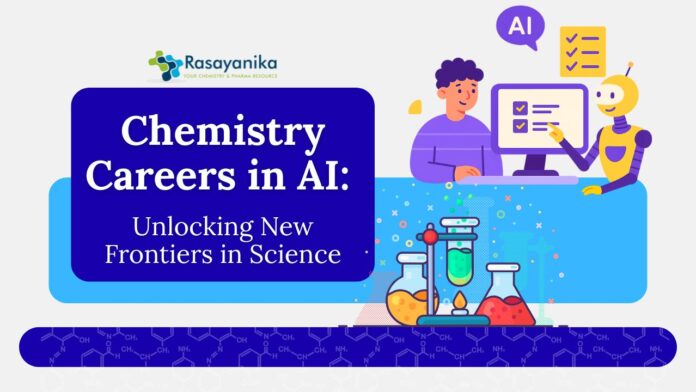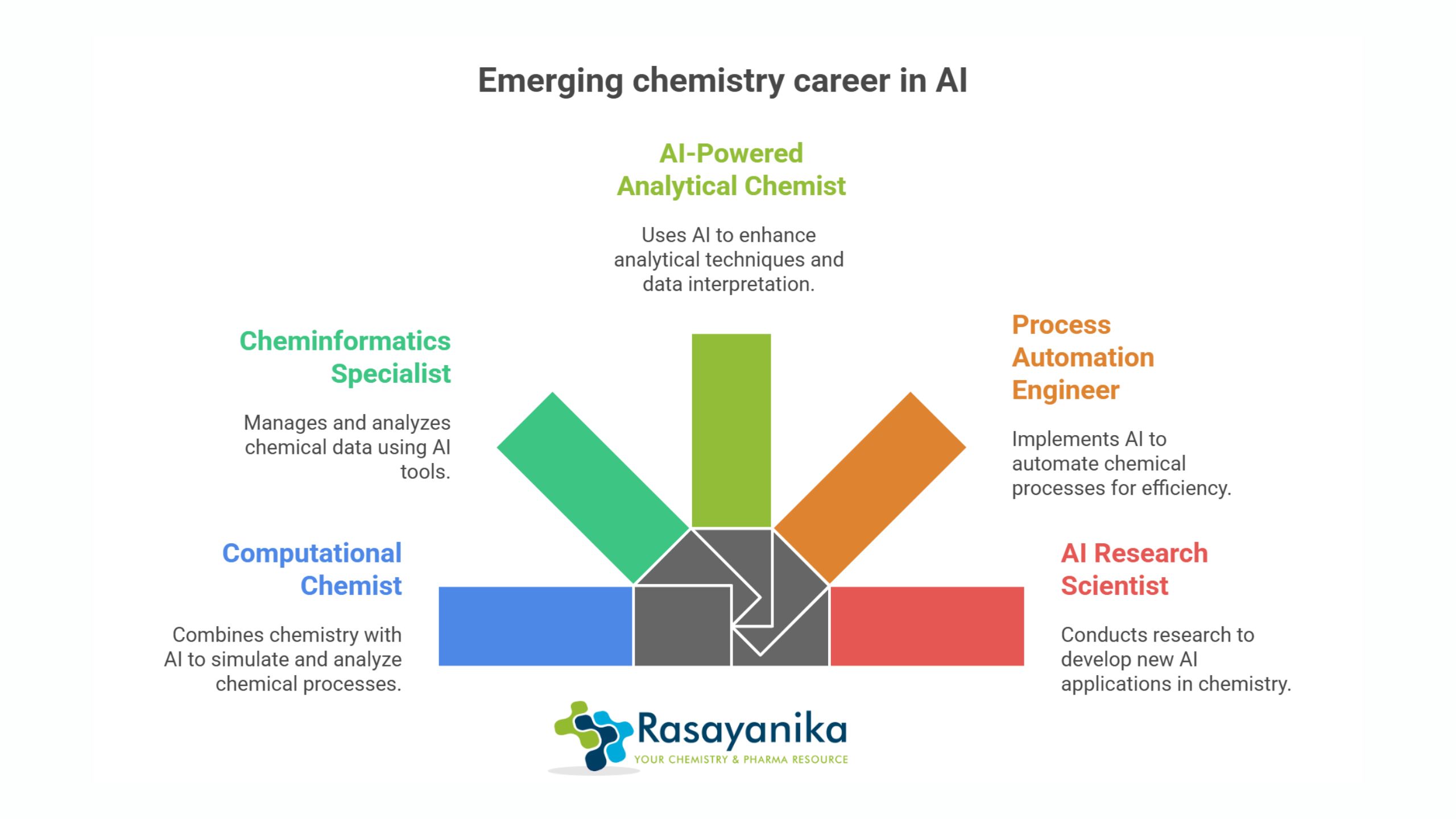AI in Chemistry: Unlocking New Frontiers in Science
Chemistry has always fascinated humans! There are numerous groundbreaking discoveries in fields such as pharmaceuticals, materials science, and environmental solutions. With the advent of technology, the discipline is experiencing an even more profound transformation today. A new career frontier is emerging at the intersection of science and technology. And this not only helps us understand the mechanics more easily, but also facilitates faster discoveries.
Artificial Intelligence (AI) and automation are reshaping laboratories, revolutionising data analysis, and redefining how experiments are conducted. For students and professionals looking for chemistry careers, this fusion presents exciting opportunities that were previously unimaginable, even a decade ago. The rise of chemistry careers and the use of AI in chemistry shows how rapidly the profession is evolving and expanding into high-tech domains.
Why AI is a Game-Changer for Chemistry?
Chemistry is one of the fields that generates a humongous amount of data. In each experiment carried out, researchers obtain a massive amount of results. Those results could be obtained through chromatographic techniques, volumetric analysis, and other methods, and some could also be derived from reactions and molecular structure analysis. It will be a tedious process to classify each piece of data and process it to obtain the desired results.
However, with the help of AI, the time taken to process the datasets has been significantly reduced. Additionally, AI can process the data more efficiently, without missing any required details. This has made the prediction patterns more effective and efficient.
Suppose we consider drug discovery as an example; the conventional methods used in research often require a significant amount of time to yield a lead compound.
This kind of automation further enhances efficiency by enabling robotic systems to perform repetitive tasks, such as titrations or sample preparation. This powerful combination is not replacing chemists, but is definitely freeing them to focus on critical thinking, creativity, and discovery. No wonder AI in chemistry is quickly becoming one of the most in-demand specializations in the scientific community.
Emerging Chemistry Careers in AI
AI is already an integral part of the laboratories. This helps the chemists to consider new roles in multiple sectors, such as the following;
- Computational Chemist with AI Expertise
Professionals in this sector are required to utilize AI models that aid in predicting molecular interactions. With the help of AI tools, one can easily predict the structures and reaction pathways. By integrating AI, they accelerate simulations, enabling faster breakthroughs in pharmaceuticals, catalysis, and materials development.
- Cheminformatics Specialist
Cheminformatics blends chemistry with information technology. Here, the specialists use AI to organize chemical databases. This will help in predicting the molecular properties and designing new compounds. The area offers numerous advantages and opportunities for expertise, making it especially valuable to drug development companies and research institutions.
- AI-Powered Analytical Chemist
Analytical chemists traditionally interpret complex data from instruments like NMR or mass spectrometry. With AI, they can process massive datasets instantly, detect anomalies with higher accuracy, and even predict experimental outcomes.
- Process Automation Engineer in Chemistry
In manufacturing plants and research laboratories, these engineers design automated workflows in which robots and AI systems handle synthesis, purification, and analysis. Their role ensures consistency, reproducibility, and safety in chemical processes.
- AI Research Scientist for Chemistry Applications
These scientists develop machine learning models designed explicitly for chemical systems. Their work might involve predicting reaction kinetics, optimizing catalysts, or designing sustainable materials. They stand at the cutting edge of innovation.
As these roles expand, implementation of AI in chemistry is proving to be not only intellectually rewarding but also financially lucrative.
Skills Needed for Success
Pursuing a career related to AI in chemistry requires more than just a strong chemistry foundation. Professionals need to expand their skill sets across disciplines.
Here are a few of the key skills required:
- Core Chemistry Knowledge: It all starts with a strong basics. A thorough understanding of introductory organic, inorganic, physical, and analytical chemistry is essential for comprehending advanced studies.
- Programming and Coding: Programming languages are a must. Python, R, and MATLAB are essential for building and applying machine learning models.
- Data Science Proficiency: Understanding big data handling and using AI tools like TensorFlow or PyTorch.
- Automation Expertise: One should have familiarity with robotics, high-throughput screening, and lab automation software. This would help individuals thrive in the industry and build a successful career.
- Collaboration Skills: Candidates who possess the ability to work effectively across fields with data scientists, engineers, and biologists are highly valued by most companies.
Industries Driving Growth
The application of AI in chemistry is no longer confined to research labs. Various industries across the globe are embracing this trend:
- Pharmaceuticals: This is one of the major sectors in which AI is extensively used. AI is helping in accelerating the drug discovery processes and also reducing the failure rates of manufacturing procedures.
- Agrochemicals: Predicting crop-protection compounds and designing fertilizers.
- Materials Science: Developing advanced polymers, semiconductors, and batteries.
- Environmental Chemistry: Monitoring pollutants and modeling clean-up processes with AI sensors.
- Academia and Research: Universities are developing specialized AI-chemistry programs to train the next generation of scientists.
This wide adoption highlights how the use of AI in chemistry is branching into every major sector, from healthcare to sustainability.
Opportunities and Salaries
The demand for chemists with expertise in AI is growing rapidly. In India, the estimated annual salary ranges for such roles are:
- Cheminformatics Specialist: ₹66 lakh – ₹99 lakh per year
- Computational Chemist (AI-focused): ₹74 lakh – ₹1.16 crore per year
- Automation Engineer in Chemistry: ₹70 lakh – ₹1.08 crore per year
This is why AI in chemistry is now viewed as one of the most future-ready career paths for science graduates in India, combining innovation, high demand, and financial growth.
Educational Pathways
Students aspiring to enter this field can begin with a degree in chemistry and then branch into areas such as AI and automation. Possible routes include:
- Online Courses: Multiple platforms offer machine learning courses for scientists.
- University Programs: Some institutions now offer hybrid MSc or PhD programs combining AI and chemistry.
- Certifications and Workshops: Many companies provide training in AI applications specific to chemistry.
Keeping up with journals such as Nature Chemistry or Journal of Cheminformatics is also vital to staying ahead.
The Future of Chemistry Careers in AI
In a futuristic way, the use of AI in chemistry is expected to expand even further. Someday, we may even have a laboratory where AI can assist researchers in suggesting experiments. Robots can help in executing those experiments and analyzing the results in a much faster and more effective way.
All these advancements will lead to easy access to personalized medications, sustainable energy solutions, and environmentally friendly materials. These will be the results of integrating AI in chemistry.
With further advancements that we can anticipate in the future, we can easily observe how chemists can act more like strategists rather than manual operators. The incorporation of AI tools and techniques in chemistry is no longer considered a trend; it is, in fact, a paradigm shift. This has helped the researchers gain momentum and redefine their careers as well. AI in chemistry careers can now be considered as an inclusion of traditional expertise to have better digital innovation in the field.
The message is clear: chemistry is no longer just about the lab bench, it’s about harnessing intelligence, both human and artificial, to solve the world’s toughest challenges.















































